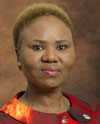By Minister Lindiwe Zulu
 The Small Business Development Ministry is supporting the aspiration of women who want to enter the economy. Programmes are in place for their greater skills development and re-skilling. We want women to take advantage of these programmes.
The Small Business Development Ministry is supporting the aspiration of women who want to enter the economy. Programmes are in place for their greater skills development and re-skilling. We want women to take advantage of these programmes.
Their time to take their rightful place in all sectors of society, especially the economy, is now. The greater inclusion of women in the economy could be the elixir to reduce unemployment, poverty and inequality as envisioned in the National Development Plan.
Women are a powerful economic driver when they are meaningfully involved in the economy through entrepreneurial activities and employment in decision-making roles.
Evidence has shown in developed and developing economies that when more women join the labour force, in particular become entrepreneurs, there is a rise in gross domestic product.
Women have always been instrumental in our country’s advancement. They played a crucial role in the struggle and ushering in our new democratic order.
This month we honour the heroic deeds of the thousands of women who bravely marched to the Union Buildings on 9 August 1956 to turn the course of history.
They stood against the tyranny of an illegitimate system and the triple yoke of oppression of race, class and gender. They marched for freedom, equal representation, land rights and direct access to justice.
While there have been numerous strides to advance women over the past 21 years, many of them, particularly black women in rural areas, continue to be economically marginalised.
The full potential of women on the economic front is still to be realised as the remnants of apartheid and societal obstacles continue blocking them.
The complete integration of women into the economy will go a long way in the fight against the triple challenge of unemployment, inequity and poverty.
According to the Clinton Foundation, which runs women empowerment projects across the world, helping women access greater economic opportunities increases a family’s resources for food, healthcare and education.
Despite the many hardships women face, they have always risen in the fight against poverty. When women are empowered families thrive, communities are safer, and economies grow.
Women entrepreneurs are known to use profits from their business to improve their families’ living conditions and lifestyle. More critically, they invest in their children's education which ensures that the cycle of poverty gets broken.
The government understands that investing in women is one of the most effective development tools of our time to both uplift women and children. It stops generational poverty and in the process stimulates economic growth.
We have therefore prioritised the advancement of women, particularly their participation in the economy, so that they can take their rightful place in our society.
Gender equality and women’s empowerment is central to our transformation agenda and it is also at the heart of our efforts to stimulate sustainable development.
Over the past 21 years we have worked to empower women and given them the tools to rise above their challenges. The government has created the institutional capacity dedicated to their development and prosperity.
President Jacob Zuma strengthened the country’s response to women empowerment by establishing the Ministry of Women.
The Gender Equality Bill was introduced to accelerate the empowerment of women and attain 50/50 gender parity. The Commission on Gender Equality is mandated to monitor, evaluate and research women’s rights and gender equality.
We are also facilitating access to formal employment for women through the Employment Equity Act under which employers will be required to work towards more equitable representation based on gender, race and disability. The Act was recently amended to ensure that women receive the same compensation as their male counterparts under the “equal pay for work of equal value” principle.
The Public Service has set a shining example with its steady progress in integrating women in key decision-making roles. This has, however, not been replicated in the private sector. The status quo of relatively low representation of women on corporate boards and as Chairpersons and Chief Executives is simply not good enough.
Empowerment should be a priority to all and can be made a reality if government, business and civil society work together to move women forward.
We want women to take advantage of these available programmes. The time for women to take their rightful place in all sectors of society, especially the economy, is now.
Lindiwe Zulu is Minister for Small Business Development





